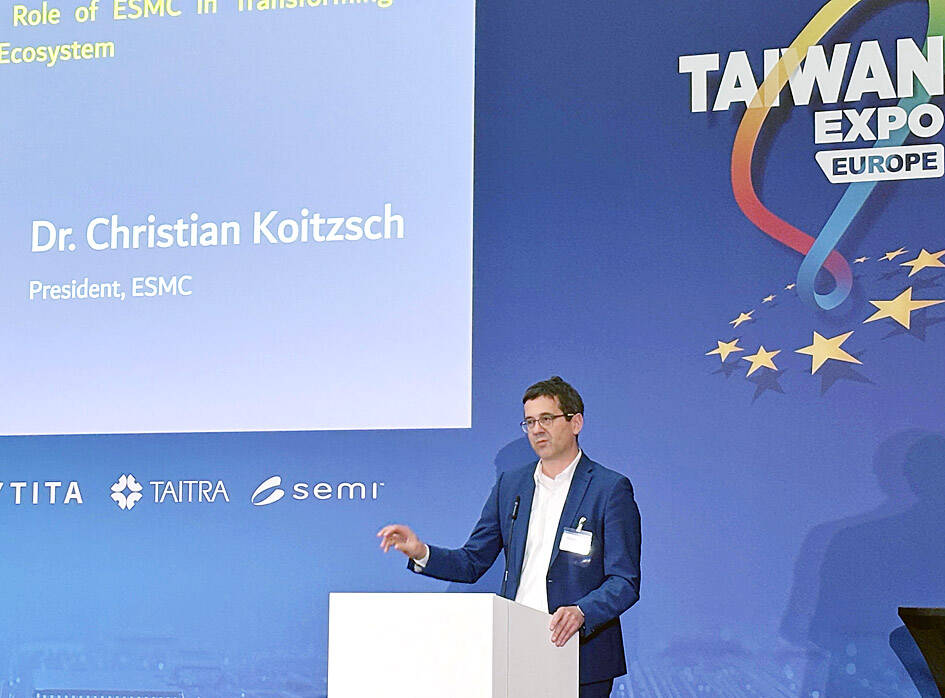European Semiconductor Manufacturing Co (ESMC), a subsidiary of contract chipmaker Taiwan Semiconductor Manufacturing Co (TSMC, 台積電), will hire almost 2,000, from Germany and other European countries, ESMC president Christian Koitzsch said on Monday.
At the Taiwan-Europe semiconductor cooperation forum in Berlin, Koitzsch said ESMC would utilize TSMC’s advanced technologies, talent in Europe and good work ethic in Germany to build a world-class talent pool for the semiconductor industry.
In August last year, TSMC announced it would team up with Robert Bosch GmbH, Infineon Technologies AG and NXP Semiconductors NV to set up ESMC, in which the Taiwanese partner would hold a 70 percent stake and the three foreign partners would own the remaining 30 percent.

Photo: CNA
The joint venture is scheduled to break ground on a 12-inch wafer fab in Dresden, the capital city of Saxony, in the second half of this year with mass production slated to start at the end of 2027, using TSMC’s 12 nanometer, 16nm, 22nm and 28nm processes for the production of automotive electronics and specialty industrial devices.
In addition to the large recruitment campaign, TSMC will dispatch hundreds of engineers to Dresden over the next three to five years to boost exchanges with ESMC, Koitzsch said.
Koitzsch, a physicist, switched jobs earlier this year to become the head of ESMC after holding different roles at Bosch and had headed the company’s Dresden Bosch plant since July 2021.
The ESMC president said his company will send its employees to Taiwan for training to better understand how the wafer fab will operate, which is expected to improve the new Dresden facility’s operational efficiency and eventually help to build a semiconductor ecosystem in Germany.
According to Koitzsch, ESMC’s clean room will have an area of about 45,000 square meters, while the facility’s economies of scale are expected to cut operating costs, strengthen competitiveness, and create tremendous job opportunities in the supply chain.
Koitzsch said ESMC’s new plant will apply to a wide range of green technologies so that the facility’s water consumption will be about 50 percent of the industry’s average and power consumption by every 1 square centimeter silicon chip will be about 60 percent of the industrial average.
Koitzsch added that the new fab is expected to roll out about 480,000 12-inch wafers a year to boost Germany’s share in the global market.
While EMSC is planning to build a large talent pool, Torsten Thieme, an advisor with Silicon Saxony, said unions in Germany always take a hardline stance to employers and that’s one of the challenges TSMC has to conquer.
With more than 500 members, Silicon Saxony is the largest high-tech network in Saxony, one of the largest information and communications technology clusters in Germany and microelectronics clusters in Europe, the organization said on its Web site.
In the wake of a labor shortage, TSMC needs to come up with competitive compensation to attract production line workers and engineers to work for ESMC, Thieme said.
Wolfgang Weber, CEO of ZVEI (the German Electro and Digital Industry Association), said as it is three years away from mass production of ESMC’s new facility in Dresden in 2027, TSMC still has time to work with the academy and government agencies to cultivate talent.
Weber said he knew Taiwanese people worked very hard and long hours but it is unlikely to request workers in Germany to work 50 hours a week.

Intel Corp chief executive officer Lip-Bu Tan (陳立武) is expected to meet with Taiwanese suppliers next month in conjunction with the opening of the Computex Taipei trade show, supply chain sources said on Monday. The visit, the first for Tan to Taiwan since assuming his new post last month, would be aimed at enhancing Intel’s ties with suppliers in Taiwan as he attempts to help turn around the struggling US chipmaker, the sources said. Tan is to hold a banquet to celebrate Intel’s 40-year presence in Taiwan before Computex opens on May 20 and invite dozens of Taiwanese suppliers to exchange views

Application-specific integrated circuit designer Faraday Technology Corp (智原) yesterday said that although revenue this quarter would decline 30 percent from last quarter, it retained its full-year forecast of revenue growth of 100 percent. The company attributed the quarterly drop to a slowdown in customers’ production of chips using Faraday’s advanced packaging technology. The company is still confident about its revenue growth this year, given its strong “design-win” — or the projects it won to help customers design their chips, Faraday president Steve Wang (王國雍) told an online earnings conference. “The design-win this year is better than we expected. We believe we will win

Chizuko Kimura has become the first female sushi chef in the world to win a Michelin star, fulfilling a promise she made to her dying husband to continue his legacy. The 54-year-old Japanese chef regained the Michelin star her late husband, Shunei Kimura, won three years ago for their Sushi Shunei restaurant in Paris. For Shunei Kimura, the star was a dream come true. However, the joy was short-lived. He died from cancer just three months later in June 2022. He was 65. The following year, the restaurant in the heart of Montmartre lost its star rating. Chizuko Kimura insisted that the new star is still down

While China’s leaders use their economic and political might to fight US President Donald Trump’s trade war “to the end,” its army of social media soldiers are embarking on a more humorous campaign online. Trump’s tariff blitz has seen Washington and Beijing impose eye-watering duties on imports from the other, fanning a standoff between the economic superpowers that has sparked global recession fears and sent markets into a tailspin. Trump says his policy is a response to years of being “ripped off” by other countries and aims to bring manufacturing to the US, forcing companies to employ US workers. However, China’s online warriors